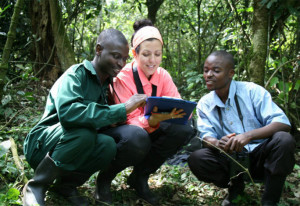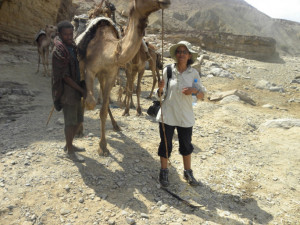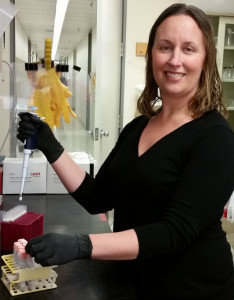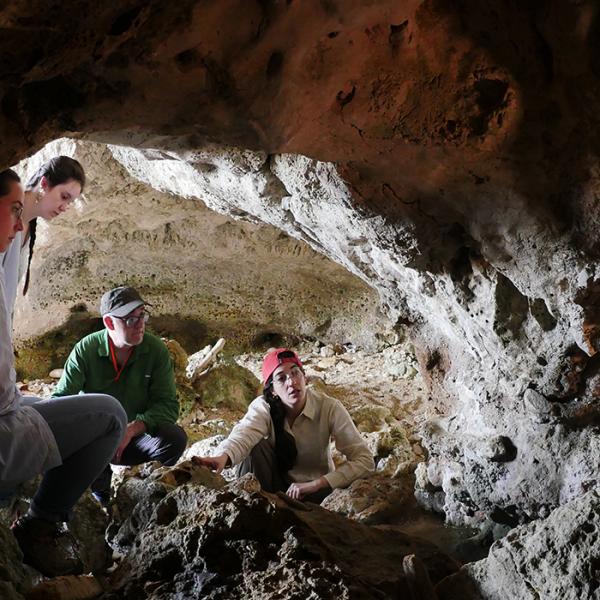The Department of Anthropology is excited to welcome three new faculty members next semester
This fall, the Department of Anthropology at Washington University will welcome three new hires: Krista Milich, Helina Woldekiros, and Emily Wroblewski.
 Dr. Krista Milich is a primate behavioral ecologist and socioendocrinologist with a particular interest in reproductive physiology and sexual selection. Her work aims to not only understand the proximate and ultimate mechanisms associated with the evolution of primate social systems, but also to use that knowledge to inform primate conservation efforts. She received her Ph.D. in Anthropology from the University of Illinois at Urbana-Champaign with a dissertation titled “The impact of habitat quality on female red colobus (Procolobus rufomitratus) reproduction in Kibale National Park, Uganda”.
Dr. Krista Milich is a primate behavioral ecologist and socioendocrinologist with a particular interest in reproductive physiology and sexual selection. Her work aims to not only understand the proximate and ultimate mechanisms associated with the evolution of primate social systems, but also to use that knowledge to inform primate conservation efforts. She received her Ph.D. in Anthropology from the University of Illinois at Urbana-Champaign with a dissertation titled “The impact of habitat quality on female red colobus (Procolobus rufomitratus) reproduction in Kibale National Park, Uganda”.
After graduating, she worked as a postdoctoral researcher in the Institute for Mind and Biology at the University of Chicago studying behavioral and physiological variation among high-ranking male rhesus macaques (Macaca mulatta) on Cayo Santiago, Puerto Rico. Her most recent postdoctoral position was in the Department of Anthropology at the University of Texas at Austin, where she studied behavioral, hormonal, microbial, and genetic variation in spider monkeys and woolly monkeys at Tiputini Biodiversity Station, Ecuador. Dr. Milich has extensive experience conducting research in the tropics, including two years of field work in Uganda, six months of field work on Cayo Santiago, and most recently, field work in Ecuador. For each of these projects, she worked in molecular laboratories to analyze the associated biological samples. Her continued collaborations at these field sites and laboratories allows her to take a comparative approach to understanding primate behavioral ecology. Her long-term research in Uganda has also resulted in a collaborative effort to improve conservation through a community-based anti-crop raiding project that will reduce human-wildlife conflict. Dr. Milich’s research will continue at WashU with her endocrinology lab in McMillan Hall.
 Dr. Helina Woldekiros has been hired as the most recent addition to the Archaeology faculty. Her areas of specializations are subsistence and economic anthropology, bioarchaeology including zooarchaeology and human osteology, foodways, human–animal interactions, and African archaeology. Dr. Woldekiros completed her dissertation at Washington University in St. Louis before receiving a Volkswagen postdoctoral fellowship at the Department of Paleoanatomy and History of Veterinary Medicine at Ludwig Maximilian University in Munich-Germany. She then returned to Washington University in St. Louis to contribute to the Department of Anthropology as a tutor and most recently, a postdoctoral research associate. Her research received media recognition this fall when her team unearthed the oldest known physical evidence for the introduction to domesticated chickens to the continent of Africa. More on that story can be found here.
Dr. Helina Woldekiros has been hired as the most recent addition to the Archaeology faculty. Her areas of specializations are subsistence and economic anthropology, bioarchaeology including zooarchaeology and human osteology, foodways, human–animal interactions, and African archaeology. Dr. Woldekiros completed her dissertation at Washington University in St. Louis before receiving a Volkswagen postdoctoral fellowship at the Department of Paleoanatomy and History of Veterinary Medicine at Ludwig Maximilian University in Munich-Germany. She then returned to Washington University in St. Louis to contribute to the Department of Anthropology as a tutor and most recently, a postdoctoral research associate. Her research received media recognition this fall when her team unearthed the oldest known physical evidence for the introduction to domesticated chickens to the continent of Africa. More on that story can be found here.
Dr. Woldekiros is working to reconceptualize the roles of the state and independent local actors in ancient trade through her Aksumite and Afar case studies in the Horn of Africa. She was the first woman to have her own camel and donkey caravan on the fabled salt route of the Afar and brings a diversity of ethnoarchaeological perspectives to the department. Her research adds new dimensions to the focus of the department archaeologists on pastoralism, trade and exchange. She also brings new methodological approaches to zooarchaeology, and opportunities for our students to work in Ethiopia. Dr. Woldekiros' research on ancient globalization and links between Africa and Asia through Arabia ties to ancient Aksumite trade routes and contextualizes livestock biodiversity in ancient and modern agricultural systems of Africa through a better understanding of cycles of introduction and local care and animal breeding in the Horn of Africa. The Department of Anthropology is excited that she will continue her work through Washington University in St. Louis.
 Dr. Emily Wroblewski joins the department as a biological anthropology faculty member. She is a geneticist from Stanford University School of Medicine where she worked as a research scientist for the Departments of Microbiology & Immunology and Structural Biology investigating chimpanzee and bonobo population and evolutionary immunogenetics of the major histocompatibility complex (MHC). MHC molecules are critical to the immune response to infection and also influence other essential, but often competing, fitness-related functions such as reproduction and social behavior. She obtained her Ph.D. from the University of Minnesota after studying behavioral ecology and evolution and characterizing male reproductive success and father-offspring behavior in the chimpanzees of Gombe National Park, Tanzania.
Dr. Emily Wroblewski joins the department as a biological anthropology faculty member. She is a geneticist from Stanford University School of Medicine where she worked as a research scientist for the Departments of Microbiology & Immunology and Structural Biology investigating chimpanzee and bonobo population and evolutionary immunogenetics of the major histocompatibility complex (MHC). MHC molecules are critical to the immune response to infection and also influence other essential, but often competing, fitness-related functions such as reproduction and social behavior. She obtained her Ph.D. from the University of Minnesota after studying behavioral ecology and evolution and characterizing male reproductive success and father-offspring behavior in the chimpanzees of Gombe National Park, Tanzania.
Using fecal samples as a non-invasive source of DNA, Dr. Wroblewski conducts an extensive comparative immunogenetic study of over 40 populations of wild African apes. Next generation sequencing and bioinformatic analysis of the MHC genomic region characterizes content both conserved and lost, gene flow, and admixture. By identifying the variation in molecules important to innate and adaptive immunity, like those of the MHC, she uses the variable occurrence of diseases, such as SIV and malaria, to determine whether there are signatures of selection characteristic of healthy and diseased populations. Using the data available from long-term study sites, Dr. Wroblewski also explores the fitness tradeoffs for these molecules between their roles in immunity and reproduction, and also characterize variation in behavior (mate choice, cooperation, aggression) according to immunogenetic similarity.



